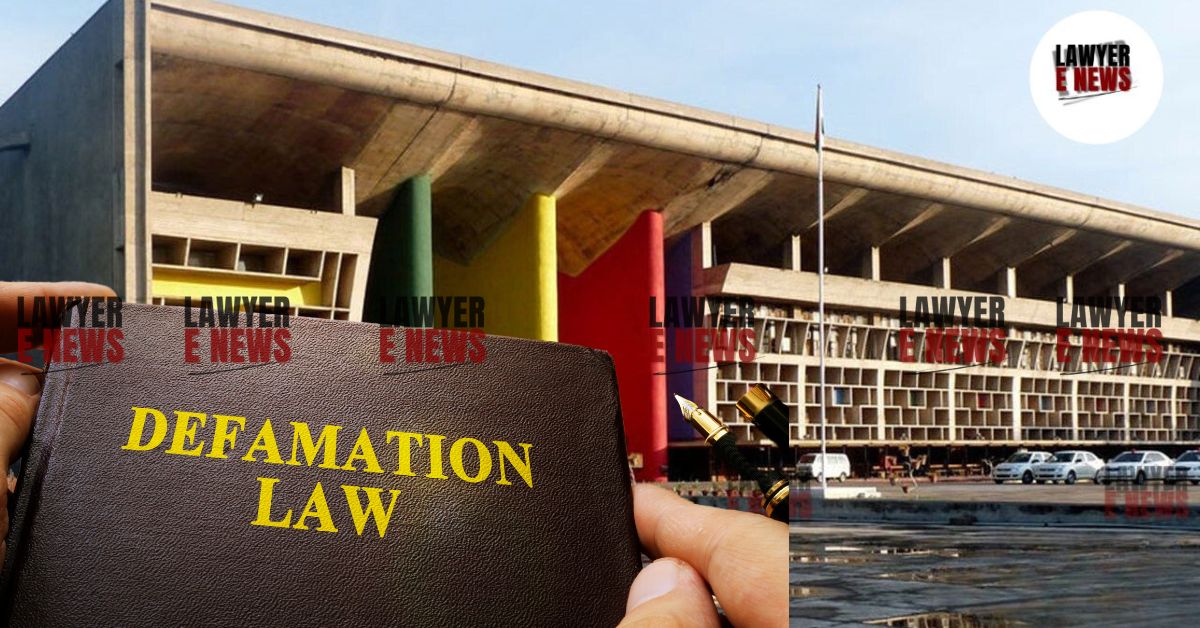-
by Admin
17 February 2026 2:34 PM



"Merely because the petitioners accurately reported the allegations in the newspapers, would not bring them within the exception unless it was established that the imputation was true and it was in public good to publish the same." — Punjab and Haryana High Court delivered a significant judgment in Rajesh Ramachandran and another v. State of Punjab and another along with connected petitions, quashing criminal proceedings against editors and journalists of reputed newspapers including The Tribune and Punjabi Tribune. The Court held that, "In the absence of any material indicating the petitioners’ complicity in the case, there was no occasion to summon them to face trial; the order is, accordingly, groundless and unsustainable."
This case centered around the alleged defamatory news report concerning Nazar Singh Manshahia, a sitting MLA, where the core issue was whether the publication of allegations made by a political leader amounts to criminal defamation.
The case originated from a criminal complaint filed by Nazar Singh Manshahia, then an MLA from Mansa, against Bhagwant Mann, Member of Parliament and AAP Punjab Convener, and several journalists and editors. The complainant alleged that Bhagwant Mann, during a press conference on 27.04.2019, accused him of accepting Rs. 10 crores and a lucrative post from the ruling Congress party in exchange for political defection. This statement was subsequently reported by the petitioners in The Tribune and Punjabi Tribune.
The complaint alleged, "In fact, the accused did intentionally and wilfully just to harass, humiliate, torture, defame and degrade the complainant in the eyes of public and such a statement of the accused has been read over by number of persons well known to the complainant even from locality, whereby accused levelled allegations totally on false, baseless, forged, concocted, fabricated and fictitious grounds."
The CJM, Mansa, after preliminary inquiry and considering the police report under Section 202 CrPC, summoned the journalists and editors under Sections 500, 501, and 502 IPC, observing that, "Despite having knowledge or reason to believe that such an imputation will harm the reputation of the complainant, communicated it further for printing and publishing in their respective newspapers."
The primary question was whether journalists who merely published the accurate account of a politician’s statement, without additional imputation, could be held criminally liable for defamation.
The petitioners contended, "The facts reported by them were the exact statements given in a press conference by the MP and attributed to him only which have never been disowned." They argued that their action falls squarely under the First Exception to Section 499 IPC, which protects the publication of true imputations made for public good.
The Court, however, clarified, "Merely because the petitioners accurately reported the allegations in the newspapers, would not bring them within the exception unless it was established that the imputation was true and it was in public good to publish the same."
The Court further explained that, "To constitute ‘defamation’ under Section 499 IPC, there must be an imputation and such imputation must have been made with the intention of harming or knowing or having reason to believe that it will harm the reputation of the person about whom it is made."
Citing the landmark case Jeffrey J. Diermeier v. State of West Bengal, the Court noted, "In essence, the offence of defamation is the harm caused to the reputation of a person. It would be sufficient to show that the accused intended or knew or had reason to believe that the imputation made by him would harm the reputation of the complainant, irrespective of whether the complainant actually suffered directly or indirectly from the imputation alleged."
The Court emphasized that no such ingredient was pleaded by the complainant, observing, "It is not the complainant’s case that in reporting and publishing the imputation/allegations by MP Bhagwant Singh Mann, dated 27/28.04.2019, the petitioners had the intention to harm his reputation in any manner, or that they had the knowledge or reasons to believe that it would harm his reputation."
The Court decisively held, "In the absence of any material indicating the petitioners’ complicity in the case, there was no occasion to summon them to face trial; the order is, accordingly, groundless and unsustainable."
It reinforced the settled position of law, citing State of Haryana v. Bhajan Lal, stating, "Where the uncontroverted allegations made in the FIR or complaint and the evidence collected in support of the same do not disclose the commission of any offence and make out a case against the accused, criminal proceedings can be quashed."
Referring to the Supreme Court’s view in N. Ram v. RSS, the Court reiterated, "In the instant case, the complainant has miserably failed to indicate as to how, when and in what manner, the mere accurate publication, of the statement of the main accused... was intentional or they have the knowledge or belief that it will harm its reputation."
The Court concluded, "Such fair, accurate and truthful reporting by the petitioners in the absence of mens rea would not constitute any offence. This matter is no more res integra and is now well settled."
In conclusion, the High Court held that accurate, neutral reporting of a politician's press statement, without any independent imputations or malice, does not attract criminal defamation charges. The entire criminal complaint and summoning order against the journalists were quashed.
The judgment carries significant implications for journalistic freedom and reaffirms the protection granted to fair reporting under the First Exception of Section 499 IPC.
Date of Decision: 26th March 2025
